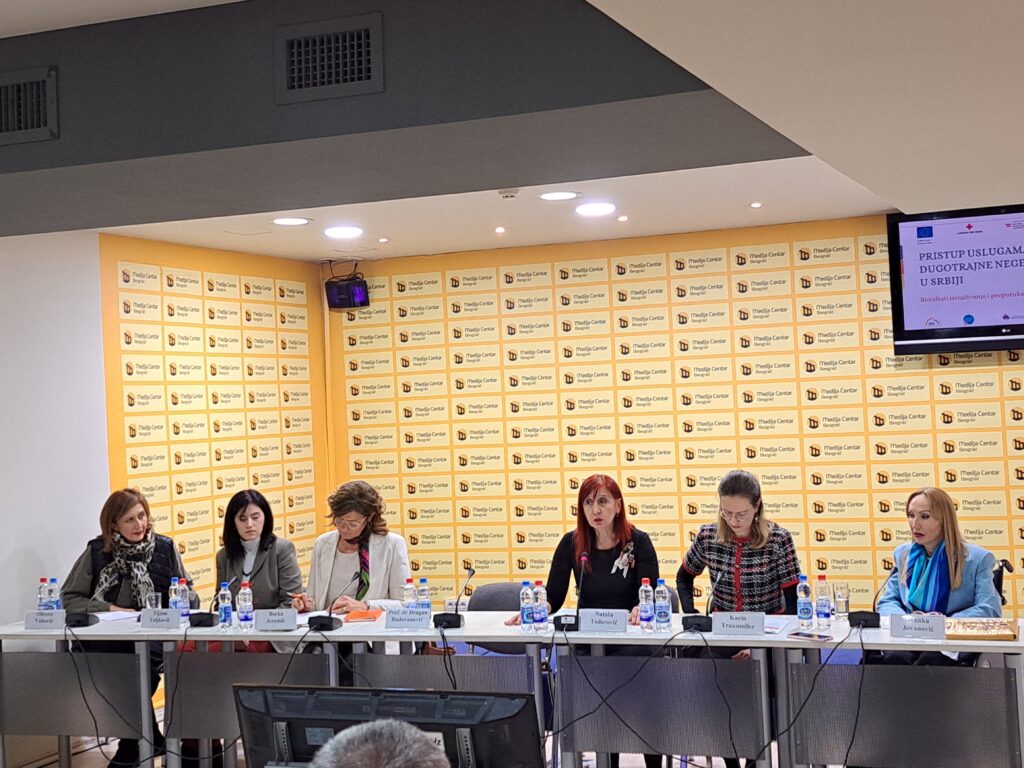As part of the project “Strengthening resilience of older persons and persons with disabilities during COVID-19 and future disasters”, the study entitled “Access to long-term care services in Serbia” was presented in the Media Center Belgrade.
Among persons in Serbia older than 65 years, as many as 40.7% are those who need long-term care due to difficulties in functioning, and among persons with disabilities aged 18 to 64, they are even more numerous – as many as 64%. They are mostly cared for by informal caregivers (90.5% of them do not receive any allowance for this), while services provided by the public sector or by private service providers and civil society are minimally represented.
This was shown by the study entitled “Access to long-term care services in Serbia”, which is created as part of the three-year project “Strengthening resilience of older persons and persons with disabilities during COVID-19 and future disasters” coordinated by the Red Cross of Serbia and supported by the European Union, the Austrian Development Agency and the Austrian Red Cross.
The research within this study, conducted on a sample of 650 people over 65 years of age and PWDs aged 18 to 64, shows that the elderly need the most support in household maintenance activities, when paying bills and purchasing, visiting the doctor, and organizing repairs in the apartment. Moreover, women need that kind of support more than men (except when preparing food). Long-term care is significantly more necessary for those over 75 years of age than for those aged 65 to 74 (47.7% vs. 34.5%). People with disabilities need the most support in household maintenance activities, when visiting the doctor, making purchases and paying bills.
Almost every tenth person in need of some form of long-term care does not have any support and is forced to manage its needs alone and, according to the results of the research conducted among respondents of this study this is more pronounced in smaller towns than in villages and large cities. The most common reasons are the respondents’ assessment that they can still function independently (PWDs under 65 years of age), insufficient information about the availability of services (persons over 65 years of age) and lack of trust.
Informal caregivers are the main pillar of care, specifically spouses and children, whereby men more often rely on their wives (40.2% of men vs. 25.3% of women), and women rely on children for support (48.8% of women vs. 31% of men). PWDs aged 18 to 64 rely on their parents in almost half of the cases (46.2%).
The vast majority (90.5%) of respondents who rely on the support of informal caregivers in their daily activities, do not receive any attendance allowance from the state, and in only 23.3% of cases informal caregivers receive some expert advice on providing care from appropriate organizations and institutions such as institutions of social protection, health care or humanitarian organizations.
These results were presented by Tijana Veljković from the SeConS Development Initiative Group, the organization that developed this study, saying that the study was a pioneering undertaking done according to the same methodology for the entire region. “The study should be the basis for formulating recommendations on how to increase the capacity of service providers and civil society organizations, improve public policies, and increase financial contributions. This is the way to ensure better access to long-term care services for the elderly and people with disabilities in regular circumstances, and especially in the case of emergency situations such as the pandemic caused by the COVID-19 virus,” emphasized Veljković.
Nataša Todorović, coordinator of the Red Cross of Serbia regional project and one of the authors of the study recalled that, according to global research, the need for long-term care is greatest among people over 65 years of age and people with disabilities, and that almost a third of people over 65 years of age in Europe have difficulties in performing daily activities, with more women than men among them. “It is estimated that, on a global level, the number of people potentially in need of long-term care will increase from 30.8 million in 2019 to 38.1 million in 2050,” Todorović said.
_______________________________
** Long-term care means a range of services and assistance for people who, as a result of mental and/or physical frailty and/or disability over an extended period of time, depend on help with daily living activities and/or are in need of some permanent nursing care. (The European Commission and Social Protection Committee 2014 definition)
_______________________________
The project “Strengthening resilience of older persons and persons with disabilities during COVID-19 and future disasters” was launched at the end of 2020, and it connects civil society partners from Serbia, Albania, Bosnia and Herzegovina, Montenegro, North Macedonia and Kosovo, as well as large civil society networks representing the elderly and people with disabilities at the level of the European Union.
The consortium of projects consists of: Red Cross of Serbia, Austrian Red Cross, Albanian Red Cross, Albanian Association of Geriatry and Gerontology, Red Cross Society of Bosnia and Herzegovina, Association for Aid and Development HAJDE, Red Cross of Montenegro, Union of the Blind of Montenegro, Red Cross of the Republic of North Macedonia, Association Humanost, Caritas Kosova, National Organization of Persons with Disabilities of Serbia, SeConS Development Initiative Group, AGE Platform Europe and European Disability Forum.

